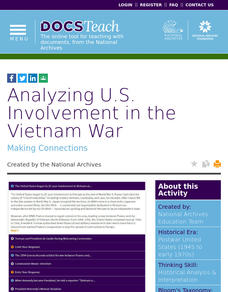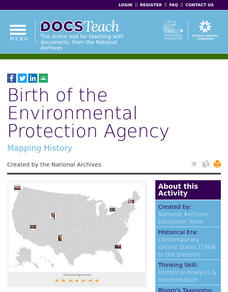Federal Reserve Bank
The Story of the Federal Reserve System
Prevent the Federal Reserve System from becoming a dry topic for your middle and high schoolers by using an informative, engaging resource! The cartoon takes your class on a journey with aliens from the planet of Novus to observe the...
Curated OER
Pay to Play?
Lead your class in a discussion about how they believe money influences politics. After reading "Go Ahead, Try to Stop K Street" from the New York Times, they evaluate the claims in the article about the current lobbyist scandal in...
Carolina K-12
Political Parties and Conventions
The two major parties polarize many in America today, but it doesn't have to be that way in the classroom! Teach learners about political party platforms and modern campaigns with a mock political convention. After watching a PowerPoint...
PBS
Reading Adventure Pack: Government
A reading adventure pack looks closely at government with the help of two books—one fiction, one nonfiction, and a series of activities. Learners craft a mobile to visualize a balanced government, participate in a scavenger hunt around...
K20 LEARN
Government Power: Do the Actions of Government Effect Me?
What does the government have to do with getting a driver's license? Including the calorie count for a meal on a restaurant menu? By discussing these kinds of questions and researching how concepts behind federal, state, and local...
DocsTeach
Analyzing the Gulf of Tonkin Resolution (Original Draft Resolution)
Breaking news, President Johnson addresses the nation! Scholars watch a video of President Johnson's address to Congress regarding the Gulf of Tonkin Resolution. The activity focuses on the motivation behind the resolution and the...
DocsTeach
Analyzing US Involvement in the Vietnam War
War: unavoidable or a necessary evil? A thought-provoking activity explores the United States' long involvement in the Vietnam War as well as the aftermath. Scholars research and summarize primary documents and complete online worksheets...
iCivics
iCivics Backyard Adventure
Imagine arguing a real Supreme Court case! Running your own county government! Acting as President for a day! iCivics offers games, web scavenger hunts, and other activities that encourage summer scholars to learn about their communities...
DocsTeach
Challenger Explosion Photograph Analysis
Young historians turn into detectives in a thought-provoking activity on the Challenger Explosion. The activity uses an image of President Reagan watching the Challenger explode on live TV to help academics practice historical analysis....
DocsTeach
Birth of the Environmental Protection Agency
Seeing is believing when it comes to climate change. An informative activity explores the creation of the Environmental Protection Agency (EPA) and its efforts to document environmental issues with photographs. Academics match images...
DocsTeach
Where Was the New Deal?
Young historians delve into the origin of federal social programs to understand the impact of the New Deal. An informative activity explores some of the New Deal programs, such as the Civilian Conservation Corp, using historical...
DocsTeach
The School Lunch Program and the Federal Government
The school lunch program is rooted in the struggles of the Great Depression and is still assisting families today. Academics research documents and images relating to the creation of the school lunch program. Scholars use a worksheet to...
National Constitution Center
Separation of Powers
Learners explore how the Constitution provides for separation of power and limited government, as evidenced by the three branches of government. They participate in role-playing situations, group discussions, and complete worksheets to...
University of Richmond
Renewing Inequality: Family Displacements through Urban Renewal 1950-1966
What is progress? Who bears its cost? High schoolers consider the questions as they review data on families displaced by urban renewal projects in the 1950s and 1960s. An interactive, curated data project asks historians to consider the...
Benjamin Franklin Tercentenary
Benjamin Franklin, Elder Statesman
Ben Franklin was the only American to sign The Declaration of Independence, the Treaty of Alliance with France, the Treaty of Paris, and the US Constitution. An interesting resource explores his role in the latter by comparing the US...
Judicial Learning Center
The Power of Judicial Review
Marbury v. Madison is arguably the most important landmark case in the history of the Supreme Court. A fact-filled lesson provides background information about the case and two others related to the concept of judicial review. Scholars...
Judicial Learning Center
Civil Rights and Equal Protection
Almost every American is familiar with the Supreme Court case of Brown vs. Board of Education. Far fewer understand the constitutional reasoning or the wide-ranging consequences of the ruling in the field of criminology. The interesting...
Judicial Learning Center
Your 1st Amendment Rights
Why should classes care about the First Amendment? An engaging lesson serves as a powerful tool for answering just that. As all four cases in the lesson relate directly to freedom of expression in schools, young scholars explore the...
Judicial Learning Center
Your Day in Court
Whether out of choice or necessity, people want to know what will happen on a typical day in court. A helpful lesson walks scholars in the field of criminology through the trial process from opening statements to the final verdict.
Judicial Learning Center
The Appeal Process
Why doesn't the Supreme Court hear testimony from witnesses? How do they complete an entire proceeding in less than two hours? A helpful lesson guides scholars of criminology through these and other questions by explaining how appeals...
Judicial Learning Center
The Judge and the Jury
Unless you are a lawyer, you might not understand just how unrealistic Law and Order and other legal dramas actually are. Here's a great resource to help scholars of criminology gain a more realistic perspective. The lesson outlines the...
Judicial Learning Center
Judicial Independence
Most people support the idea of an independent judiciary in theory until they hear about a court case that violates their principles. An informative resource explains why the concept is important. It also provides scholars of criminology...
Judicial Learning Center
About Federal Judges
Not just anybody can do the job of a federal judge, but according to the United States Constitution just about anybody can be appointed. The lesson outlines the process and requirements for becoming a federal judge, focusing on the...
Judicial Learning Center
Levels of the Federal Courts
The Supreme Court gets all the glory, but very few federal cases make it to the highest court. An interesting lesson explores the structure of the lower levels of the federal court system. In addition to outlining the organization of...

























